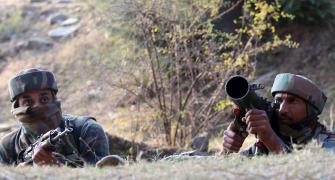With the PMO itself spearheading a re-evaluation, the Director General of Defence Accounts has been asked to justify its earlier contention that the 'slab based' system would benefit a larger number of disabled veterans -- something the army flatly denies, reports Ajai Shukla.
Facing severe criticism from serving soldiers, veterans and civilians alike for slashing the military's disability pensions, senior government officials have told Business Standard they were reviewing the decision and could soon roll back at least some cuts.
The government had issued a notification on September 30 -- a day after announcing the army's strikes on terror camps in Pakistan occupied Kashmir -- announcing that it had slashed allowances that soldiers receive for injuries/disabilities attributable to military service, or aggravated by it.
The government accepted the recommendation of the Seventh Central Pay Commission to calculate disability pension according to a 'slab system', based on rank.
This significantly reduced the disability pensions, compared with the 'percentage system' instituted by the 6th CPC.
The government first reacted by claiming (through 'government sources' cited by several newspapers) that disability pensions had actually been increased, not cut.
Thereafter, the government backtracked on October 13, announcing that it had referred the decision on disability pensions to the anomaly committee of the 7th CPC for consideration.
A senior government official told Business Standard: "We are not wedded to any position. We want to ensure that disabled soldiers do not suffer. If our review finds that the earlier 'percentage based' system was more beneficial than the 'slab system' that has now been implemented, we will revert to the earlier system."
A partial or complete revocation of the 'slab system' by the anomalies committee would have to be cleared by the Cabinet.
With the Prime Minister's Office itself spearheading this re-evaluation, the Director General of Defence Accounts has been asked for detailed figures to justify its earlier contention that the 'slab based' system would benefit a larger number of disabled veterans -- something the army flatly denies.
Until the September 30 notification, any officer or soldier who suffered 100 per cent disability that was 'attributable to military service, or aggravated by military service' would get 30 per cent of his/her last drawn pay as disability pension.
In addition, they would draw a 'service component' of pension, which amounted to 50 per cent of their last pay drawn.
Under the new rules, which come into effect retrospectively from January 1, 2016, the 'service component' remains unchanged, but a 'slab system' has been introduced for disability pension -- Rs 27,000 a month for officers, Rs 17,000 for junior commissioned officers, and Rs 12,000 for other ranks.
The army calculates that only those soldiers would benefit who are invalidated out in the early stages of their careers -- a small minority.
Those who have served a few years, and all those who have earned pensions, would lose financially.
The new system would only benefit those jawans whose pay at the time of release from service is less than Rs 40,000 (Rs 34,800 (basic pay) + Rs 5,200 (military service pay, or MSP)) under the 7th CPC.
At higher pay grades, 30 per cent disability pension would amount to more than Rs 12,000.
Very few jawans retire before serving 15 years, when they become eligible for pension. Most retire after at least 17 to 19 years, which they have signed up for.
By that time, they have been automatically promoted to Naik (two stripes), and their emoluments are Rs 41,100 (Rs 35,900 + Rs 5,200 MSP).
Most jawans actually attain the rank of Havildar (three stripes), which means they are eligible for 26 years of service, and a pay grade of Rs 50,100 (Rs 44,900 + Rs 5,200).
Hence, most retirees at the jawan level (except those rare cases who are invalidated early in their careers) earn well above the level below which the slab system yields greater benefits. They, therefore, stand to benefit from the percentage system.
Similarly, JCOs would only benefit from the slab system if their pay grade at retirement is below Rs 56,200 (Rs 51,000 + Rs 5,200 (MSP)).
Above that grade, the disability pension of 30 per cent would be greater than the slab rate of Rs 17,000.
In fact, most JCOs start retiring as Subedars, with 28 years of service, when their pay grade is Rs 57,200 (Rs 52,000 + Rs 5,200).
Similarly, commissioned officers only benefit from the slab system if their pay at release is less than Rs 90,000 (Rs 74,500 + Rs 15,500 (MSP)). That is because 30 per cent of any pay grade above this would be greater than the slab rate of Rs 27,000.
At seven years of service, officers' pay grade rises above that level. Most officers retire after 20 years of service, when they become eligible for pension.
The army asks: If the 'slab system' was indeed beneficial for lower ranks, why hasn't it been made applicable to other services like the Central Armed Police Forces?
In fact, there is no demand from the CAPFs for extending the slab system to them.
Top army doctor accuses generals of manipulating disability pensions
A key argument marshalled by the 7th CPC that reduced the military's disability pensions has been that the number of senior officers claiming disabilities have been rising steadily.
This suggests they have been making false claims to get additional pensions and tax benefits.
The source of that argument, as Business Standard has learnt, is a letter from the military's top doctor, complaining to the defence secretary that senior generals misuse their position and influence to 'be placed in low medical classification few months before their superannuation.'
Lieutenant General B K Chopra, the Director General Armed Forces Medical Services, who retired in June, wrote in a demi-official letter to then defence secretary Radha Krishna Mathur, 'disability pensions have become an easy and attractive source of tax-free supplementary income' for senior officers.
General Chopra goes on to suggest that 'tax exemption related to disability pension should also be removed.'
The 7th CPC, noting this trend, recommended that disability pensions be calculated through a 'slab system' that effectively lowers benefits for most pensioners, including officers, junior commissioned officers (JCOs) and other ranks (ORs).
General Chopra confirmed to Business Standard that he wrote that letter on December 16, 2014. He said it was his intention to reduce the pressure from generals on his doctors, not to strip away disability benefits from lower ranks, as has happened after the government implemented the pay commission's recommendations.
"I never questioned the payment of disability benefits to lower ranks and soldiers. They are not in a position to influence the medical boards anyway," he says, referring to the bodies that categorise the level of disabilities in patients.
The DGAFMS' letter suggests that medical boards of senior officers be held in facilities located away from where they are exercising command, in order to minimise unfair influence.
General Chopra told Business Standard his letter was circulated by the defence ministry to the three service chiefs for comments and suggestions, but they ruled out changing the system of medical boards.
The government is learned to be considering ways of tightening up medical boards for senior military officers, including by holding them in reputed civil hospitals rather than in military facilities.











